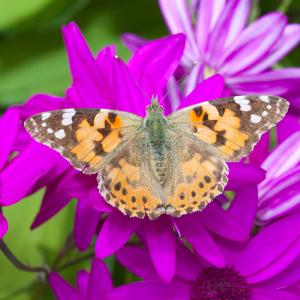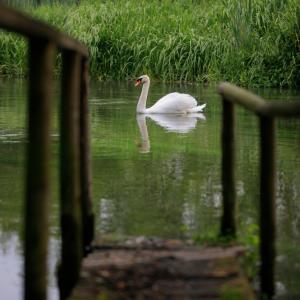It’s the perfect time to get outdoors and enjoy our Great British countryside – including the amazing wildlife that call it home.
But we’re losing our incredible wildlife at an alarming rate. Between 1970 and 2013, 56% of species in the UK declined. We need to act quickly to restore nature to its glorious best.
Here we look at 5 threats to UK wildlife and how we can overcome them together.
1. Agricultural Intensification
The problem
The biggest impact on UK wildlife has been the intensification of agriculture.
Agriculture accounts for over 70% of land use in the UK, but the environmental damage we have suffered while inside the current Common Agricultural Policy has been significant.
Soil health has deteriorated. Numbers of farmland bird species such as the grey partridge, tree sparrow, skylark, linnet and yellowhammer have dropped. Precious UK habitats have been eroded.
Intensive farming has resulted in the loss of flower meadows, hedgerows and trees – all of which are vital habitats for pollinating insects such as bees, with knock-on effects for species further up the food chain.
What we can do about it
We need to make sure farmers are supported to do things that are good for nature but don’t bring in direct income.
As we leave the EU, we have a golden opportunity to change the way we manage our land in bold ways that could help us restore nature. However whilst UK Government has publicly committed to ‘being a world-leading protector of the natural world’, their actions are falling far short of this ambition.
We need the UK Government to hear loud and clear that we won’t stand to see further loss of wildlife as we leave the EU.
2. Plastics
The problem
It’s been hard to miss some of the shocking facts about our plastic waste recently. Did you know for instance, that by 2050 there could be more plastic in the ocean than fish? Or that we flush away 3.4 billion wet wipes each year?!
Plastics are choking our rivers and seas and killing our precious wildlife – including here in the UK. Seabirds are found with their stomachs full of plastic items, while microplastics are consumed by animals such as plankton, passing the problem back up the food chain.
What we can do about it
Individuals, businesses and governments all have an important role to play in stemming the plastic tide. We’re supporting Sky Ocean Rescue’s #PassOnPlastic campaign to tackle the plastic pollution crisis that’s choking our seas. And we’re calling for a ban on avoidable single use plastics by 2025.
But we can all play our part. Help us put an end to the plastic surge by cutting out single-use, everyday plastics, starting today.

3. Climate change
The problem
You’re probably aware of the threat that climate change poses to iconic species such as polar bears or snow leopards. But it will increasingly have an impact on wildlife right here in the UK too.
Changing weather patterns – for example longer periods of drought, warmer summers, or more flooding – will all have a knock-on effect on our wildlife. Many of our most iconic mammals, such as badgers, moles and hedgehogs, eat invertebrates that favour wetter weather and could be threatened by climate change.
Many migratory birds could also be affected, as their passage is closely synchronised with food availability. Shifts in seasons could therefore have a serious impact on their survival chances.
What we can do about it
We have the knowledge and the technology to reduce our impact on the climate and ease the pressures on the world's most vulnerable places, people and wildlife. We just need to make it happen.
Through our campaigning and advocacy work, we're driving changes in policy and legislation in the UK. You can do your bit to help by eating more sustainably, or making a promise for the planet and switching to green energy.

4. River Damage
The problem
Our rivers not only help make the British landscape so picturesque and vibrant, they’re also a vital source of fresh water for people, industry, farming and wildlife.
But our rivers have suffered from ‘over-abstraction’ – taking too much water out – as well as pollution from fertilisers and pesticides. Less than a fifth of England’s rivers are healthy, which poses a big threat to amazing UK wildlife such as water voles and kingfishers.
What we can do about it
We’ve been working with Coca-Cola to improve farming practices and reduce agricultural pollution. Working with farmers in Norfolk, Kent and Greater London, we’ve been helping to deliver methods that will reduce the pollution currently harming chalk streams.
You can help support our work and helping us to make nature matter through e-actions and campaigns.

5. Pesticides
The problem
Another result of the intensification of agriculture has been an increase in the use of pesticides. Specific types of pesticides – neonicotinoids – were recently banned by the EU due to concern about the large scale harm caused to bees.
But they’re not the only pesticides that pose a threat to UK wildlife. In fact, many slug pellets used in gardens around Britain contain an active ingredient called ‘metaldehyde’ (a chemical also used widely by farmers) which can cause huge damage if it's not applied carefully. It can enter our waterways and into our drinking water.
The pellets can also be washed into drains or ditches, find their way into our rivers, and harm animals much larger than slugs. Like microplastics, this toxic chemical can be passed up the food chain, harming predators like hedgehogs or birds.
The solution
In your own garden, you can try to avoid metaldehyde, using natural alternatives such as copper strips to deter slugs – or look to create an environment that encourages predators like slow-worms or hedgehogs.
On a larger scale, we’ve been looking at the UK government’s plans for a new environmental watchdog. We’ve joined calls for the new watchdog to have strong jaws and big teeth – and real targets for it to enforce, to ensure nature is protected once we leave the EU.
Help save UK nature and Wildlife
The UK is one of the most nature-depleted countries in the world. A donation will help us protect, nurture and replenish cherished UK wildlife and our nation’s threatened land, rivers and seascapes.

 7 species we rarely see now
7 species we rarely see now
 UK rivers and chalk streams
UK rivers and chalk streams